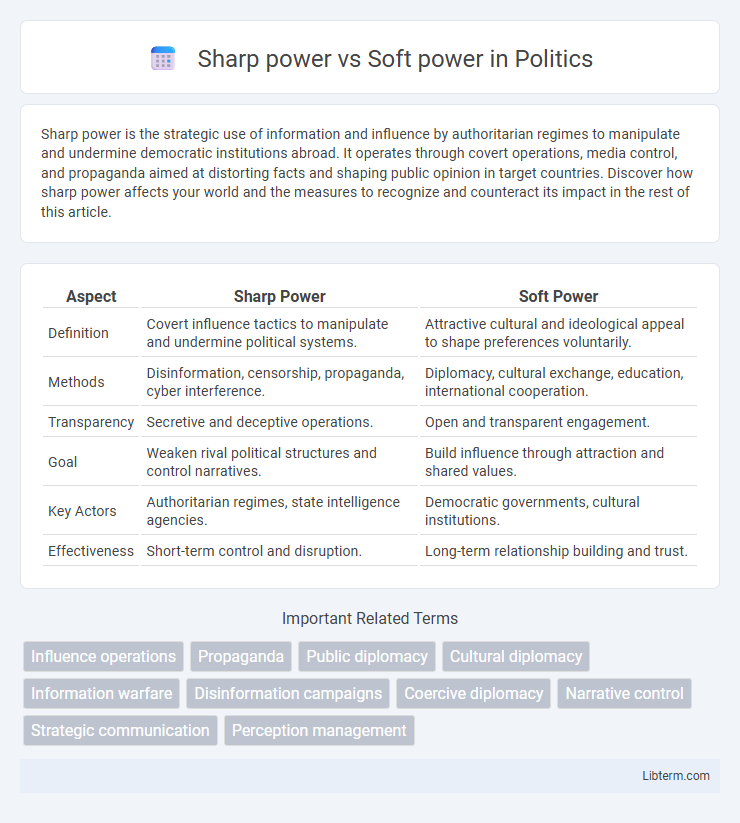Sharp power is the strategic use of information and influence by authoritarian regimes to manipulate and undermine democratic institutions abroad. It operates through covert operations, media control, and propaganda aimed at distorting facts and shaping public opinion in target countries. Discover how sharp power affects your world and the measures to recognize and counteract its impact in the rest of this article.
Table of Comparison
| Aspect | Sharp Power | Soft Power |
|---|---|---|
| Definition | Covert influence tactics to manipulate and undermine political systems. | Attractive cultural and ideological appeal to shape preferences voluntarily. |
| Methods | Disinformation, censorship, propaganda, cyber interference. | Diplomacy, cultural exchange, education, international cooperation. |
| Transparency | Secretive and deceptive operations. | Open and transparent engagement. |
| Goal | Weaken rival political structures and control narratives. | Build influence through attraction and shared values. |
| Key Actors | Authoritarian regimes, state intelligence agencies. | Democratic governments, cultural institutions. |
| Effectiveness | Short-term control and disruption. | Long-term relationship building and trust. |
Definition of Sharp Power
Sharp power refers to the use of manipulative and coercive tactics by a country to influence and undermine the political environment of another nation, often through disinformation, censorship, and media manipulation. Unlike soft power, which relies on attraction and persuasion through culture, values, and diplomacy, sharp power exploits information vulnerabilities to distort perceptions and disrupt democratic processes. It is primarily employed by authoritarian regimes to project covert influence and control over foreign populations and institutions.
Understanding Soft Power
Soft power refers to the ability of a country to influence others through attraction and persuasion rather than coercion or payment, relying on cultural appeal, political values, and foreign policies perceived as legitimate. It contrasts with sharp power, which uses manipulative tactics like disinformation and censorship to undermine or control other nations. Understanding soft power involves recognizing how nations build positive international relationships and foster global cooperation by promoting shared values, culture, and diplomacy.
Key Differences Between Sharp Power and Soft Power
Sharp power manipulates and distorts information to influence and undermine democratic institutions, often through censorship, propaganda, and disinformation campaigns. Soft power relies on attraction and persuasion, using cultural diplomacy, values, and policies to build positive influence and foster cooperation. Key differences include sharp power's coercive tactics versus soft power's voluntary appeal, and sharp power's goal to destabilize contrasting soft power's aim to create goodwill.
Historical Origins of Both Power Concepts
Sharp power originated in the early 21st century as a term describing authoritarian regimes' efforts to manipulate information and influence in democratic societies, contrasting sharply with Joseph Nye's concept of soft power developed in the late 20th century, which emphasizes attraction and persuasion through culture, political values, and foreign policies. Soft power gained prominence during the post-Cold War era, highlighting the role of non-coercive strategies in international relations, while sharp power evolved with the rise of digital technology and information warfare in the 2010s. The historical divergence lies in soft power's foundation in liberal internationalism versus sharp power's roots in strategic deception and covert influence.
Methods and Tools of Sharp Power
Sharp power employs manipulative methods such as disinformation campaigns, censorship, and covert influence operations to undermine democratic institutions and shape public opinion in target countries. Tools of sharp power include cyberattacks, state-controlled media outlets that spread propaganda, and the use of cultural or academic exchanges to covertly push political agendas. These tactics contrast with soft power's emphasis on attraction and persuasion by leveraging cultural diplomacy and positive messaging.
Mechanisms of Soft Power Influence
Soft power influence operates through cultural diplomacy, media outreach, and educational exchanges that foster positive perceptions and voluntary cooperation among foreign publics. It leverages values, institutions, and policies that appeal to other nations' identities and aspirations, promoting alignment without coercion. Key mechanisms include cultural exports like films and music, international scholarships such as the Fulbright Program, and public diplomacy initiatives that build trust and shape global norms.
Case Studies: Sharp Power in Action
Sharp power exploits manipulation and censorship to influence political narratives, often employed by authoritarian regimes like China and Russia to suppress dissent and control information abroad. Case studies reveal how China's Confucius Institutes and Russia's RT network disseminate propaganda to undermine democratic institutions in Western countries. These tactics contrast with soft power's emphasis on attraction and cultural diplomacy, as sharp power focuses on deceptive strategies that disrupt open societies.
Case Studies: Soft Power Success Stories
South Korea's global influence demonstrates soft power success through its cultural exports like K-pop and Korean dramas, fostering positive international perceptions and economic benefits. The British Council's promotion of English language and education exemplifies soft power, enhancing the UK's global standing and diplomatic relationships. Japan's use of technology and cultural diplomacy, such as hosting the Olympics and promoting anime, illustrates effective soft power strategies that boost national prestige and tourism.
Impact of Sharp and Soft Power on Global Politics
Sharp power, characterized by manipulative tactics such as disinformation and cyber espionage, undermines democratic institutions and sows distrust in global politics, often leading to increased geopolitical tensions. Soft power, derived from cultural influence, diplomacy, and economic partnerships, fosters cooperation, builds international alliances, and enhances a nation's global reputation. The interplay of sharp and soft power shapes international relations, where the former destabilizes and the latter stabilizes the global order.
Future Trends in International Power Dynamics
Sharp power, characterized by manipulative tactics and information control, is expected to intensify as authoritarian regimes invest heavily in disinformation campaigns and cyber operations targeting democratic institutions. Soft power will increasingly rely on cultural diplomacy, technological innovation, and global governance participation to build alliances and influence international norms. The future of international power dynamics will hinge on the balance between sharp power's covert influence strategies and soft power's appeal-based legitimacy in shaping global cooperation and conflict.
Sharp power Infographic

 libterm.com
libterm.com